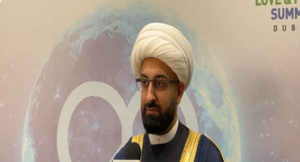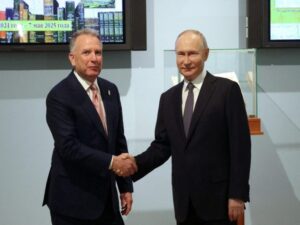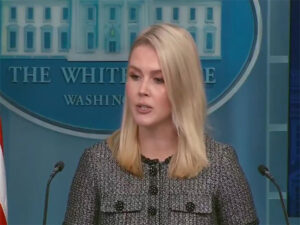India-UAE Economic Partnership is a major milestone in history of both nations: UAE Minister for Foreign Trade
Abu Dhabi [UAE], July 15 (ANI): Just hours before Prime Minister Narendra Modi lands in Abu Dhabi, the United Arab Emirates (UAE) has said that its economic partnership with India “is a significant milestone in the history of both nations”.
The UAE’s Minister of State for Foreign Trade, Dr Thani bin Ahmed Al Zeyoudi, said in an interview, that the UAE-India non-oil trade is expected to reach USD 100 billion a year by 2030.
Thani bin Ahmed Al Zeyoudi noted that UAE-India Comprehensive Economic Partnership Agreement (CEPA) was designed to deliver a new era of growth and opportunity.
CEPA is an agreement signed between India and UAE on February 18, 2022, and came into force on May 1, 2022. The agreement was signed between Prime Minister Narendra Modi and UAE President Sheikh Mohamed bin Zayed Al Nahyan.
Speaking about the success of the CEPA between India and UAE, Dr Thani Al Zeyoudi said, “There is little question that the UAE-India Comprehensive Economic Partnership Agreement will come to be regarded as a significant milestone in the history of both nations.”
“By removing or reducing tariffs on 80 per cent of goods, eliminating unnecessary barriers to trade, creating new platforms for investment, and opening government procurement to each other’s private sector, the UAE-India CEPA was designed to deliver a new era of growth and opportunity – and, ultimately, boost bilateral non-oil trade beyond USD 100 billion by 2030,” he said.
Highlighting the key outcomes of CEPA between India and UAE, the minister said that there is an increase in bilateral trade flows and that the CEPA has added considerable resilience to East-West supply chains and developed a new trade corridor that connects Asia with the Middle East and Africa.
Dr Thani Al Zeyoudi further stressed that he has been able to witness the effect of UAE investment in India in various sectors, including retail, industry, food security, technology, healthcare and logistics.
“The increase in bilateral trade flows is obviously one of the most significant outcomes. Beyond numbers, though, it’s clear the CEPA has added considerable resilience to East-West supply chains and created a new trade corridor that connects Asia with the Middle East and Africa,” the UAE minister said.
“We have seen major logistics providers adding capacity on these routes, including the launch of Maersk’s ‘Shaheen Express’ to link India to the UAE and Saudi Arabia, while SeaLead are offering a new India-Dubai-East-Africa (IDEA) route,” he added.
“In addition, we have witnessed significant new investment flows. In India, I have been able to witness the impact of UAE investment in sectors as diverse as retail, industry, food security, technology, healthcare and logistics. I am also very excited about some of our renewable energy projects, including a 300-megawatt hybrid plant in Gujarat, which includes an innovative battery energy storage system,” he said.
In May 2023, the Ministry of Commerce and Industry in an official statement said that during the past one year, CEPA has made a significant impact on India’s bilateral trade with UAE and particularly India’s exports to the UAE.
The bilateral trade between India and UAE has increased from USD 72.9 billion in April 2021-March 2022 to USD 84.5 billion in April 2022-March 2023, the ministry said.
UAE Minister Dr Thani bin Ahmed Al Zeyoudi further pointed out that UAE has witnessed growth in the export of key products, and said that they expect its trade and investment with India to keep increasing in the coming years and decades.
Responding to a question on how the economic partnership between India and UAE reflected on enhancing the performance of various economic and business sectors, the UAE Minister said, “From our side, we’ve seen real growth in the export of key product sectors such as iron, steel, aluminium and polymers. Data from the Indian side shows that textiles, gems and jewellery, footwear, fruits and nuts and automobiles have all increased.”
“But, again, this is a plan designed to spark holistic, broad-based growth. So, we fully expect trade and investment to keep climbing in the coming years and decades. By opening up new high-growth markets, we will spark a new era of industrial output, create new opportunities for services exports, particularly finance, professional services, tourism and consulting, and catalyze growth across many other sectors,” he added.
Thani Al Zeyoudi’s statement comes ahead of Prime Minister Narendra Modi’s arrival in UAE for an official visit after a two-day trip to France.
PM Modi has already emplaned from France and is scheduled to land in Abu Dhabi, UAE on Saturday morning (local time). PM Modi will meet UAE President Sheikh Mohamed bin Zayed Al Nahyan during his visit.
Before his departure from India, PM Modi in a statement released by Prime Minister’s Office said, “Our two countries are engaged across a wide range of sectors such as trade, investments, energy, food security, science & technology, education, fintech, defence, security, and robust people-to-people ties. Last year, President Sheikh Mohamed bin Zayed and I agreed on a Roadmap on the future of our partnership, and I look forward to discussing with him how to further deepen our ties.”
PM Modi noted that UAE will be hosting the 28th Conference of Parties of the UNFCCC (COP28) later this year. PM Modi stated that he looked forward to exchanging views on bolstering global cooperation towards accelerating climate action to facilitate energy transition and implementation of the Paris Agreement.
“UAE will be hosting the 28th Conference of Parties of the UNFCCC (COP-28) later this year. I also look forward to exchanging views on strengthening global cooperation towards accelerating climate action to facilitate the energy transition and implementation of the Paris Agreement,” PM Modi said in a statement.
“I am confident that my visit to UAE will usher in a new chapter in our Comprehensive Strategic Partnership,” he added.






